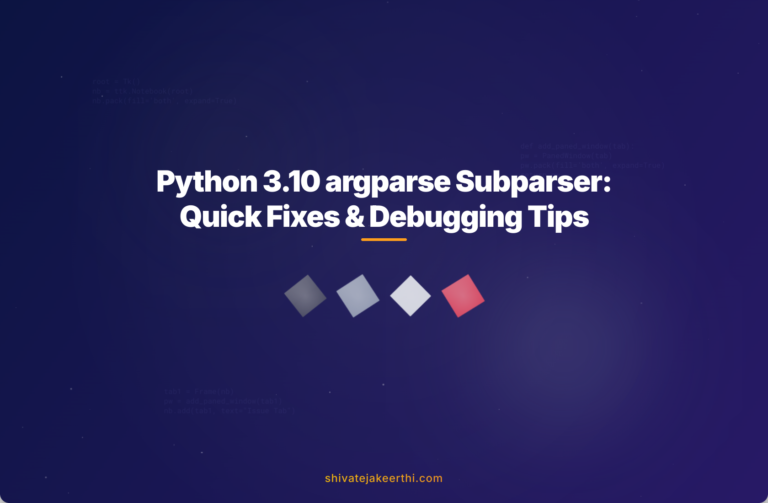If you’re working with Python scripts, especially those adapted from older research papers or tutorials, you might stumble across unexpected issues—especially if you’re running Python 3.10. One common frustration involves subparser issues from the argparse module, leading to cryptic command-line argument errors.
Recently, while reusing some Python code from an earlier research paper, I ran the scripts in VS Code. Everything looked fine until an error popped up relating to subparser arguments. This threw off what seemed like straightforward Python code that previously worked just fine.
So, what causes these problems, and how exactly can you fix them? Let’s break it down one step at a time.
Understanding the Code Error
Before trying to solve the issue, it’s crucial to understand what’s actually happening. Typically, this subparser error occurs in snippets similar to the following:
import argparse
parser = argparse.ArgumentParser()
subparsers = parser.add_subparsers(help='Commands')
parser_a = subparsers.add_parser('cmd_a', help='Run command A')
parser_a.add_argument('--foo', type=str, help='Option for command A')
parser_b = subparsers.add_parser('cmd_b', help='Run command B')
parser_b.add_argument('--bar', type=int, help='Option for command B')
args = parser.parse_args()
In this example, subparsers create separate subcommands (“cmd_a” and “cmd_b”) with their own unique arguments. This structure is useful when you have multiple functionalities in a single script, each giving users flexibility.
However, after upgrading Python or libraries, you might run into confusing errors like:
error: unrecognized arguments: --foo
This means the script doesn’t recognize arguments you’re trying to use, despite them appearing correct. It’s puzzling, especially if they’ve worked before.
Why Does This Error Occur?
So, why is your script refusing to recognize arguments suddenly? Usually, the culprit is changes in recent versions of Python or the argparse module itself.
Python 3.10 and newer updates may handle argument parsing differently. For instance, certain methods that worked fine previously—or which people used incorrectly—may not function anymore due to stricter standards or deprecations.
The specific error above appears primarily because arguments are being parsed incorrectly or out-of-sequence, leading your argparse code to misinterpret command-line inputs.
Troubleshooting Steps for Fixing Argument Parsing Issues
When encountering strange parsing errors, follow these common troubleshooting steps:
- Review command-line arguments: Make sure you’re feeding correct arguments into your script, matching exactly what you’ve defined.
- Check library compatibility: Verify the code compatibility with newer versions of Python libraries—see if any functionality has been deprecated or modified.
- Implement workarounds: Update your code to align with current standards, replacing deprecated methods or incorrectly used parser features.
Simplified Python Tips for Beginners
If you’re not confident with Python debugging yet, don’t worry. Errors like this are normal parts of development. Here are a few beginner-friendly tips you should follow:
- Read your error messages closely. Python usually hints at what’s wrong—don’t skip interpreting those messages.
- Google effectively. Chances are someone else already solved this question on platforms like Stack Overflow.
- Test incrementally. Don’t run your script only at the end. Test each section or argument separately to isolate issues quickly.
For deeper insights, start with beginner-friendly Python tutorials available on Python programming articles or check out official documentations.
Step-by-Step Fix: Adjusting the Subparser Code
To fix the particular issue that appeared earlier, you’ll first want to explicitly set the required=True parameter within your subparser if it wasn’t previously specified. Python subparsers often default to optional unless told otherwise. Adjust your code snippet as shown here:
import argparse
parser = argparse.ArgumentParser()
subparsers = parser.add_subparsers(help='Commands', required=True)
parser_a = subparsers.add_parser('cmd_a', help='Run command A')
parser_a.add_argument('--foo', type=str, required=True, help='Option for command A')
parser_b = subparsers.add_parser('cmd_b', help='Run command B')
parser_b.add_argument('--bar', type=int, required=True, help='Option for command B')
args = parser.parse_args()
By adding required=True for subparsers and individual arguments, you ensure Python matches arguments explicitly and doesn’t misinterpret or skip them. After this adjustment, retest your script within VS Code to verify the issue is resolved.
Best Practices to Avoid Future Issues
Besides tackling this immediate problem, here are good practices you should incorporate into your coding workflow to avoid similar issues:
- Utilize virtual environments. Tools like venv keep project libraries isolated, helping ensure dependencies won’t unintentionally update and cause compatibility problems.
- Consistent version control. Tools like Git help track changes and quickly revert when upgrades cause trouble.
- Stay informed about updates. Regularly checking library documentation and community forums helps you quickly notice deprecated features or required script changes.
By integrating these best practices, you’ll streamline your Python workflow and reduce frustration in future projects.
Throughout this process, remember: debugging gets easier with experience. Problems like argument parsing errors happen frequently, especially when borrowing older code or advancing to new language versions. The more times you troubleshoot such issues, the more quickly you’ll recognize and resolve future ones.
If you’re interested in deepening your Python know-how further, check Python’s official documentation on the argparse module or practical developer-focused guides available online.
References and Further Reading
If you’re looking to explore Python more thoroughly, bookmark these helpful resources:
- Python 3.10 Official Documentation – See what’s changed in the latest Python releases.
- Official argparse Documentation – Get comprehensive explanations of argument parser usage and options.
- Stack Overflow argparse Tag – Explore solutions shared by the coding community.
- Real Python CLI Tutorial – A friendly introduction to command-line apps in Python using argparse.
- Python Programming Insights & Blog Articles – Discover additional Python development advice tailored for varying skill levels.
Now, over to you—have you ever faced unexpected Python command-line issues similar to this? What solutions worked best for you? Keep experimenting, learning, and mastering your coding skills!



0 Comments